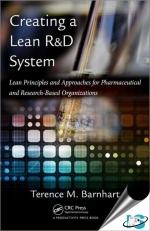Tab Article
The ability to find and remove barriers between people and their systems in R&D can almost guarantee a doubling in performance, and often delivers multiples of that. R&D teams that have smooth handoffs deliver 100 percent of the required knowledge at those handoffs. As a result, such teams do not lose critical information, have unexpected knowledge gaps appear in their projects, or have uncoordinated knowledge transfers that waste minutes, days, and even months every year.
Creating a Lean R&D System : Lean Principles and Approaches for Pharmaceutical and Research-Based Organizations lays out the logic of whyLean implementation isn’t strictly for manufacturing and describes why it can be just as effective in R&D organizations. Terence Barnhart, former senior director of continuous improvement at Pfizer R&D, describes the theoretical and physical underpinnings of creating a Lean transformation in any R&D organization, as exemplified by the Lean transformation initiated within the R&D division of a global pharmaceutical company.
Describing how to merge Lean principles with the cultural virtues inherent in R&D, the book presents Lean approaches that can be easily applied in pharmaceutical and research-based organizations. It takes a strategic approach to solving two problems unique to the Lean field. The first is in noting the key distinctions between R&D and manufacturing, and developing a Lean approach specific to the R&D environment. The second is that it proposes a systematic middle-out (merger/maneuver) strategy to help you initiate and sustain a Lean culture within your pharmaceutical R&D organization that will help you immediately engage all stakeholders involved.


